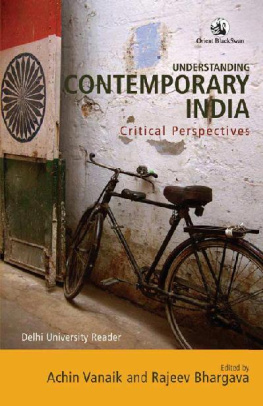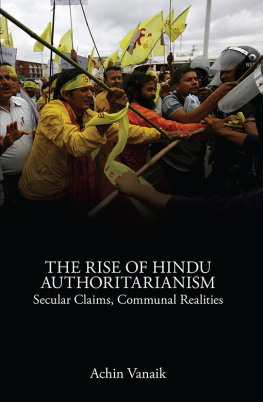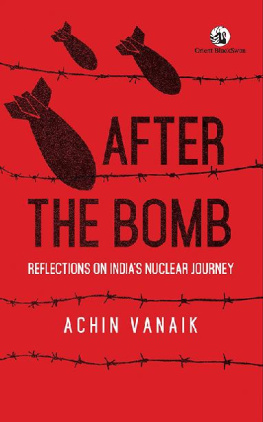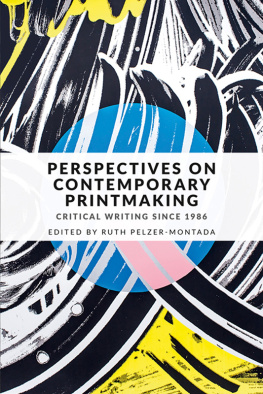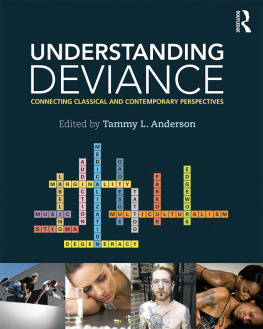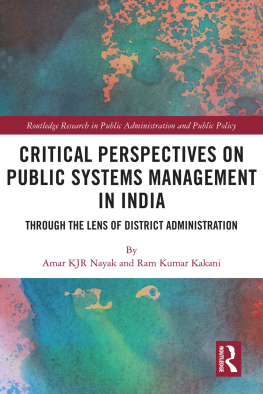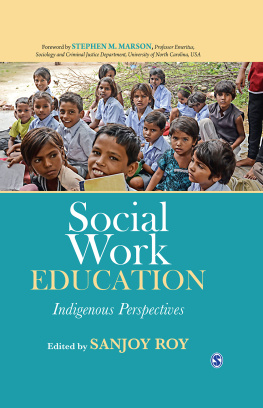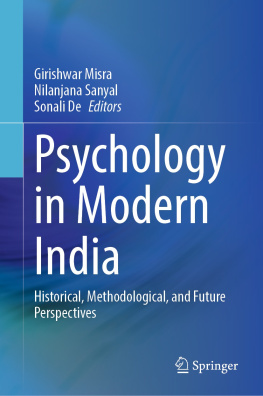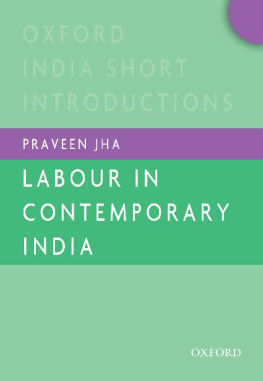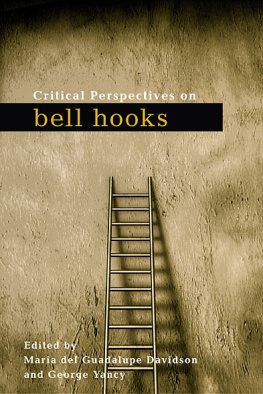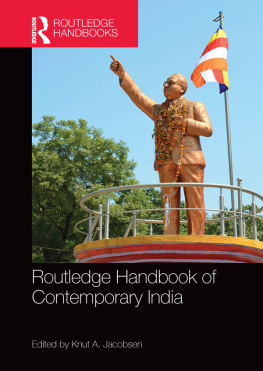Understanding Contemporary India
For our entire range of books please use search strings " Orient BlackSwan ", " Universities Press India " and " Permanent Black " in store.
Understanding Contemporary India
Critical Perspectives
DELHI UNIVERSITY READER
Edited by
Achin Vanaik
and
Rajeev Bhargava
UNDERSTANDING CONTEMPORARY INDIA
Orient Blackswan Private Limited
Registered Office
3-6-752 Himayatnagar, Hyderabad 500 029 (A.P.), INDIA
e-mail:
Other Offices
Bengaluru, Bhopal, Chennai, Guwahati, Hyderabad, Jaipur,
Kolkata, Lucknow, Mumbai, New Delhi, Noida, Patna, Vijayawada
Orient Blackswan Private Limited 2010
First published 2010
Reprinted 2015
eISBN 978-81-250-4272-3
e-edition: First Published 2017
ePUB Conversion: .
All rights reserved. No part of this publication may be reproduced, distributed, or transmitted in any form or by any means, including photocopying, recording, or other electronic or mechanical methods, without the prior written permission of the publisher, except in the case of brief quotations embodied in critical reviews and certain other noncommercial uses permitted by copyright law. For permission requests write to the publisher.
Contents
Acknowledgements
For permission to reproduce copyright material in this Reader, the volume editors and publishers wish to make the following acknowledgements.
Rajeev Bhargava , Indias Secular Constitution. Originally published in E. Sreedharan, Zoya Hasan, R. Sudarshan (ed.), Indias Living Constitution , Delhi: Permanent Black, 2002.
Neera Chandhoke , Putting Civil Society in Its Place. Originally published in Economic and Political Weekly , Vol. 40, No. 7, 1420 February, 2009.
Gopal Guru , How Egalitarian Are the Social Sciences in India. Originally published in Economic and Political Weekly, Vol. 37, No. 51, 14 December, 2002.
Manoranjan Mohanty , Social Movements in Creative Society: Of Autonomy and Interconnection. Originally published in Manoranjan Mohanty, Partha Mukherji with Olla Tormsquist (ed.), Peoples Rights: Social Movements and the State in the Third World, New Delhi: SAGE Publications India Pvt. Ltd., 1993. Copyright SAGE Publications India Pvt. Ltd., New Delhi. All rights reserved. Reproduced with the permission of the copyright-holder and the publishers, SAGE Publications India Pvt. Ltd., New Delhi.
Abbreviations
AIADMK | All India Anna Dravida Munnetra Kazhagam |
AIFODR | All India Federation of Organisations of Democratic Rights |
APC | Agricultural Prices Commission |
APCLC | Andhra Pradesh Civil Liberties Committee |
APDPIP | Andhra Pradesh District Poverty Initiative Project |
APRPRP | Andhra Pradesh Rural Poverty Reduction Programme |
ASAFLA | Asia Africa Latin America |
BC | Benefit-Cost analysis |
BPL | Below Poverty Line |
CABE | Central Advisory Board of Education |
CAG | Comptroller and Auditor General |
CENTO | Central Treaty Organisation |
CMEY | Chief Minister Employment Yojana |
DWACRA | Development of Women and Children in Rural Area |
ESIA | Economic Survey of Indian Agriculture |
FCI | Food Corporation of India |
FMS | Foreign Military Sales |
GATT | General Agreement on Tariffs and Trade |
GHQ | General Headquarters |
HYV | High Yield Variety |
ICSSR | Indian Council of Social Science Research |
IMC | Indian Middle Class |
IRDP | Integrated Rural Development Programme |
ISI | Inter-Services Intelligence |
JKLF | Jammu and Kashmir Liberation Front |
LTTE | Liberation of Tamil Tigers Eelam |
NAFTA | North American Free Trade Agreement |
NAM | Non-Aligned Movement |
NAS | New Agricultural Strategy |
NCERT | National Council of Educational Research and Training |
NCF | National Curriculum Framework |
NEP | New Economic Policy |
NMML | Nehru Memorial Museum and Library |
NPC | National Planning Committee |
NWFP | North-West Frontier Province |
PAC | Public Accounts Committee |
PDO | Peoples Democratic Organisations |
PDS | Public Distribution System |
PRO | Peoples Rights Organisation |
PUCL | Peoples Union for Civil Liberties |
PUDR | Peoples Union for Democratic Rights |
REC | Rural Electrification Corporation |
SEATO | Southeast Asia Treaty Organisation |
SERP | Society for Elimination of Rural Poverty |
SHG | Self-Help Groups |
UGC | University Grants Commission |
WTO | World Trade Organisation |
A Collective Vision
Achin Vanaik and Rajeev Bhargava
EDUCATION
E ducation, without a doubt, has an important functional, instrumental and utilitarian dimension. This is revealed when one asks questions such as what is the purpose of education? The answers, too often, are to acquire qualifications for employment/upward mobility, wider/higher (in terms of income) opportunities, to meet the needs for trained human power in diverse fields for national development. But in its deepest sense education is not instrumentalist. That is to say, it is not to be justified outside of itself because it leads to the acquisition of formal skills or of certain desired psychological-social attributes. It must be respected in itself.
Education is thus not a commodity to be acquired or possessed and then used, but a process of inestimable importance to individuals and society, although it can and does have enormous use value. Education then, is a process of expansion and conversion, not in the sense of converting or turning students into doctors or engineers, but the widening and turning out of the mindthe creation, sustenance and development of self-critical awareness and independence of thought. It is an inner process of moral-intellectual development. Education is not so much a preparation for life, but in the final analysis the finding of a way of life.

